The last Friday practice sessions prior to Formula 1’s summer break came to a close with Max Verstappen headlining FP1 at the Belgian Grand Prix, before Lando Norris slotted in the fastest time of FP2.
Verstappen is guaranteed qualify without a chance of starting on pole thanks to a 10-place engine penalty for taking new power unit components for the Spa-Francorchamps weekend — as he has done in the past two editions of the race. In those races the Dutchman recovered to claim victory, but this will be an altogether more difficult feat to achieve given the competitiveness of the McLaren team this season.
But how do his chances stack up, and does anyone other than McLaren and Ferrari stand a chance? We’ve crunched the long-run numbers from FP2 to find out who’s looking good, and who’s in need of the arrival of an overnight silver bullet.
The story of the day
In FP1, Verstappen had broadcasted his intent to compete despite the encumbrance of a grid penalty and put over half a second on his nearest challenger Oscar Piastri to sit top of the earlier session.
Expectations of rain had subsided after an early morning downpour, and thus the teams could log plenty of dry-weather running in preparation for the sunny conditions expected on Sunday. Piastri, newly minted as a grand prix winner after standing upon the top step in Hungary, was two-tenths up on Alex Albon’s moderately surprising third-best time.
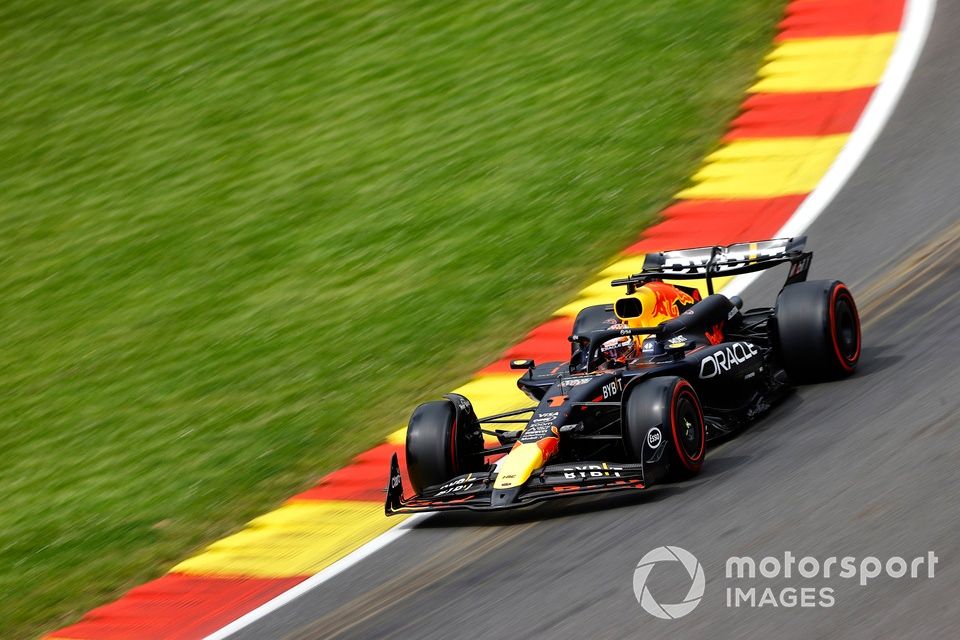
Verstappen set the early pace for Red Bull, showing his desire to put up a fight despite his grid penalty
Photo by: Andy Hone / Motorsport Images
The rain held off into FP2 and the suggestion of late-session precipitation did not emerge to allow both long-runs and qualifying simulations on softs to continue unfettered. Verstappen set the early benchmarks on mediums but, on the soft tyre, the McLarens vaulted to the top. Piastri shattered the new benchmark set by Carlos Sainz on the soft tyres, going top with a 1m42.475s, and Verstappen could only manage a time 0.002s shy of the Australian.
Norris then put himself on top of the timesheets with a 1m42.260s, also on softs, to ensure McLaren locked out the top two spots at the close of FP2. A three-and-a-half tenth gap between the top three and Ferrari’s Charles Leclerc hinted at a gap between the top three contenders and the likes of Ferrari and Mercedes — although fuel loads remain unknown at this juncture.
The improved competitiveness at the front of the field suggests that it won’t be an easy climb for Verstappen into the lead
Both Leclerc and Sainz beat George Russell, as the Briton was over a second off the fastest time; Esteban Ocon was only a further tenth behind, even after the Alpine driver missed FP1 with a battery cooling system water leak that sapped at his running.
McLaren looking good for pole — if it doesn’t rain on Saturday
The laps that Norris and Piastri set in FP2 suggested that McLaren appears to be in a good position to add to its two pole positions from this season, even without the effect of Verstappen’s grid penalty. Looking at the sector times, Norris had the advantage over everyone in the second and third parts of the lap, although Piastri was the quicker of the two in the opening sector.
Verstappen had initially looked to be the best of everyone in the middle sector, where the high-speed Pouhon and flowing medium-speed Fagnes chicane reward commitment with a helpful dose of lap time. However, Norris was able to put that to the test and found over a tenth versus the Red Bull.
Should the McLarens repeat their front-row lockout from Hungary and if Verstappen trails them, he could be expected to start 13th on Sunday’s grid. Red Bull has employed the Belgian Grand Prix for the last two seasons to take grid penalties, given its strengths align just so with the Spa-Francorchamps circuit, but the improved competitiveness at the front of the field suggests that it won’t be an easy climb into the lead. The reduced effectiveness of DRS along the Kemmel Straight — the activation zone being shortened by 75m — might reduce the frequency of ‘easy’ passes into Les Combes.
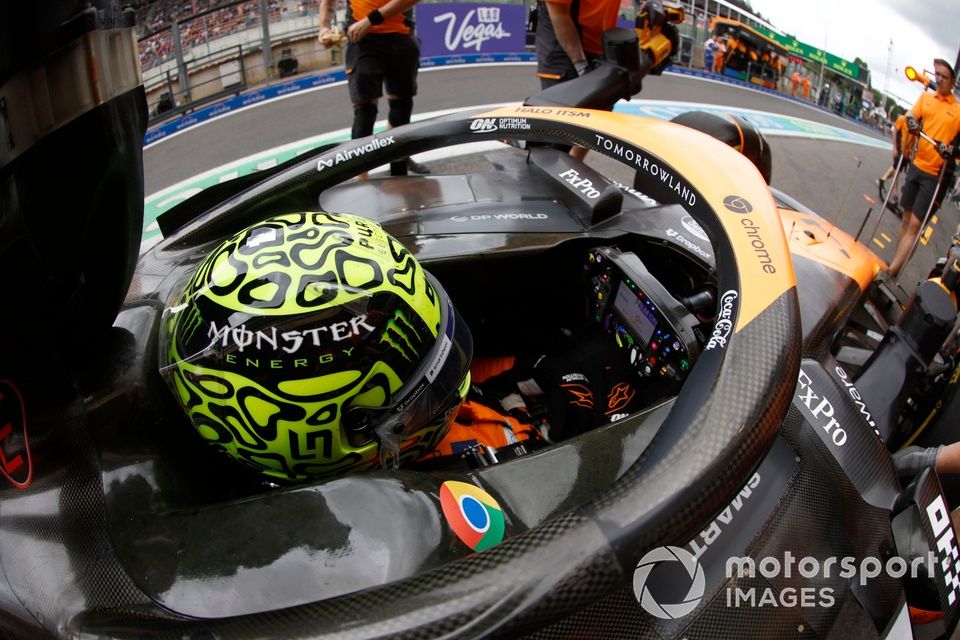
McLaren’s strength means pole for Verstappen isn’t guaranteed. A repeat of Hungary’s front-row lockout would leave Red Bull’s ace only 13th on the grid
Photo by: Steven Tee / Motorsport Images
But there’s the threat of rain, and its propensity to throw up a different order. Thursday’s forecasts had predicted rain throughout Friday’s sessions, but this proved to be elusive, so the idea that qualifying may be rain-affected cannot be entirely relied upon. But if it does, then absolutely nothing is guaranteed; Verstappen can, at best, start 11th in Sunday’s race (barring any misfortunes for any drivers ahead of him on the grid) but a misstep in low-grip conditions can offer an even less advantageous starting berth.
Comparing Norris’ fastest time to Verstappen, the speed traces show that there’s a slight advantage in McLaren’s straightline speed relative to the Red Bull. Perhaps there’s the suggestion that Red Bull’s Honda-derived powertrains have been turned down slightly, although it’s still bouncing off the rev limiter on occasion.
There are also two different approaches from Norris and Verstappen here. In the two tightest corners at La Source and Bruxelles, along with the downshifts through Les Fagnes, Norris takes his car one gear lower relative to Verstappen. The Dutchman sheds less speed into the entry of the corner as a result, but the acceleration falls away on the exit and switches from a brief swing in the delta time to Verstappen losing a smidgen of time in the long run.
Will that information change Verstappen’s approach? It entirely depends on what the powertrain settings are, although it might be a prudent step if he is confident in the acceleration of his Red Bull.
Overall, the order becomes a touch more predictable if Mother Nature decides that the Ardennes forest doesn’t need any further watering. But, in the event the rain is as intense as 2021’s near-washout qualifying session, it’ll be thrilling at the very least…
How far can Verstappen get with his grid penalty?
The initial race runs on the medium tyre, when comparing Piastri’s run to Verstappen’s, hints at McLaren and Red Bull being once again very evenly matched. Piastri’s average time, when adjusted for outliers, was just over a tenth clear of Verstappen’s stint across the same eight-lap window.
Sergio Perez turned in a longer stint for Red Bull with the mediums, amassing a 12-lap stretch that totted up to a 1m50.248s average across his turn behind the wheel. Norris, on the other hand, focused on the soft-tyre running and thus did not produce too much in the way of comparable long-run data.
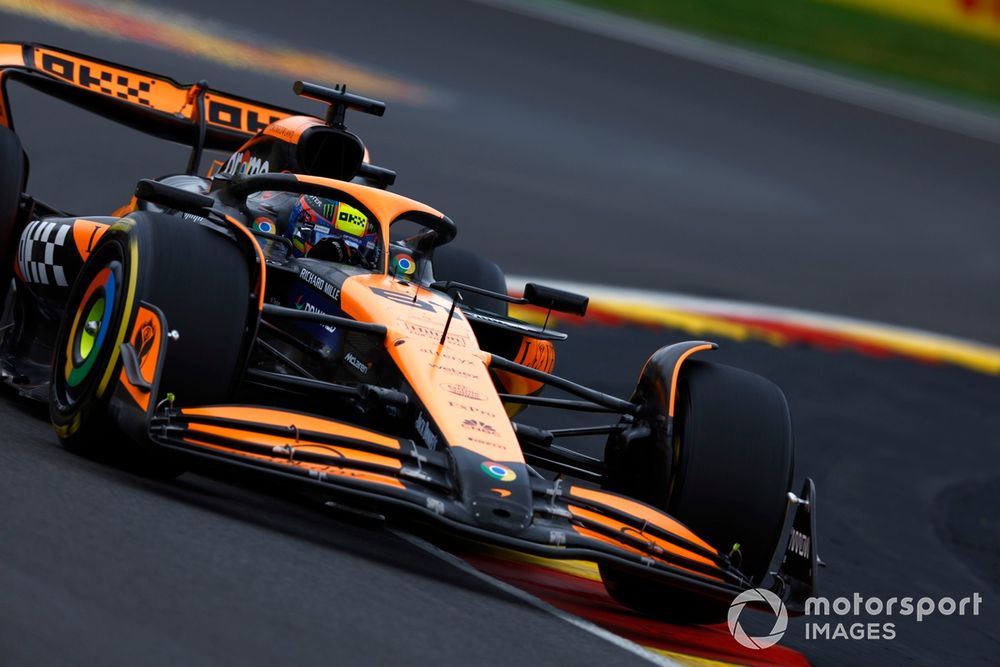
McLaren and Red Bull are evenly-matched on the medium tyres
Photo by: Zak Mauger / Motorsport Images
Average FP2 medium tyre pace
| POS | TEAM (DRIVER) | Average Time | Laps |
| 1 | McLaren (PIA) | 1m49.201s | 8 |
| 2 | Red Bull (VER) | 1m49.334s | 8 |
| 3 | Ferrari (SAI) | 1m49.829s | 9 |
| 4 | Williams (ALB) | 1m50.146s | 9 |
| 5 | Alpine (OCO) | 1m50.227s | 9 |
| 6 | Mercedes (RUS) | 1m50.331s | 11 |
| 7 | Aston Martin (ALO) | 1m50.806s | 7 |
| 8 | Sauber (BOT) | 1m50.885s | 8 |
| 9 | RB (TSU) | 1m51.608s | 10 |
| N/A | Haas did not complete a long run on the medium tyre |
So let’s the take the situation as above: the McLarens lock out the front row and Verstappen is third fastest — so starts 13th on the grid. The orange cars ultimately do have the pace to put themselves out of reach, so long as they can avoid any strife into La Source, and it might yield a hard-fought battle between Piastri and Norris if the two can match each other on tyre management.
Mercedes has struggled so far in Friday’s sessions; the W15 is haemorrhaging time in the straights and Russell complained of derating into Turn 1
To get ahead, Verstappen will either need to find something overnight that delivers a crucial injection of pace, or play the numbers and hope the team can redeem itself — in his eyes, at least — with a strategy that can offer a modicum of flexibility.
Ferrari’s race pace doesn’t look too shabby, although it appears to miss a few tenths relative to the McLarens and Red Bulls. Breaking onto the second row will be a vital component of its chances to ensure it does not fall victim to a rampaging Verstappen in the later laps; it can slot in behind the McLarens and attempt to pull clear if Verstappen starts to face traffic ahead. Leclerc and Sainz will have to expect Verstappen to appear in their mirrors at some point, and thus the Prancing Horse’s race will hinge upon delaying that.
Thus, it needs to avoid an ignominious early exit from qualifying and nail Q3 to make that happen, but that’s easier said than done if the rain hits. Avoiding a repeat of Leclerc’s Q2 exit at Silverstone will be of paramount importance.
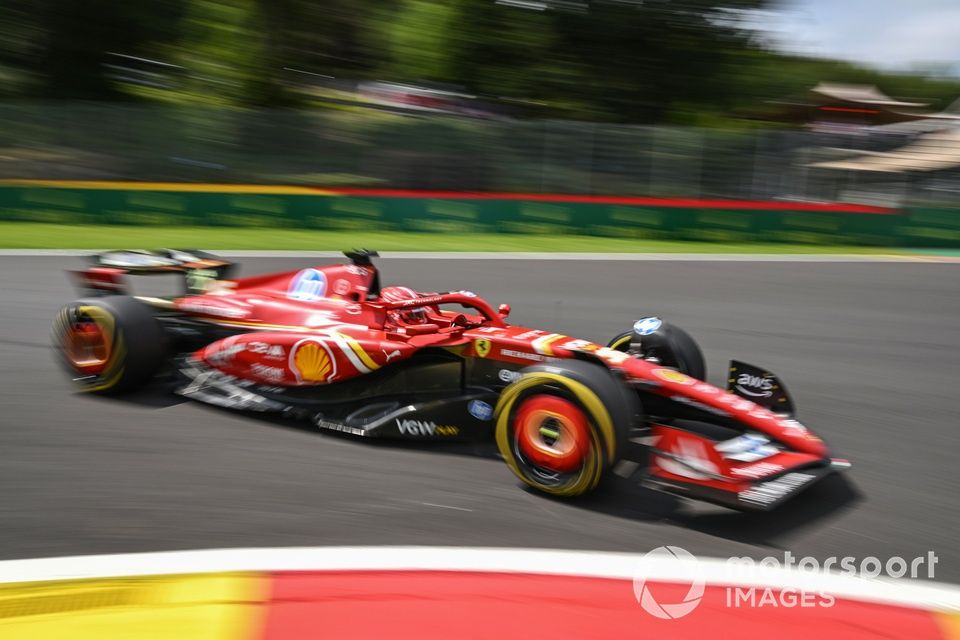
If Ferrari can get close to McLaren in qualifying, it stands a chance of a podium if Verstappen makes heavy weather of fighting through the pack
Photo by: Sam Bagnall / Motorsport Images
And what of Mercedes? That’s the kicker, as McLaren might have liked the silver cars to serve as a disruptor in the pack and give Verstappen absolutely zero quarter in any wheel-to-wheel encounters. Thing is, the team has struggled so far in Friday’s sessions; the W15 is haemorrhaging time in the straights and Russell complained of derating into Turn 1.
In Autosport’s trackside viewing of FP1, the car is being run low and has kicked up a barrage of luminescent sparks far further up the run to Raidillon compared to everyone else. Both Russell and Hamilton appeared very slow on their long runs, as evinced in the above leaderboard of average times.
Perhaps this is what Hamilton meant earlier in the season, where he felt that the car only worked in one narrow set-up window. This might be jumping to conclusions, and it could be that the two W15s turn up tomorrow with their engines turned up and start to knock on the door of pole, but it could also be that the demands of Spa have pushed Mercedes way out of its comfort zone. Russell appeared to debunk the prior theory, stating that the cars were run at full power — so the team appears to be in a spot of bother.
Running the car low is good in most instances, as it enhances the ground effect experienced by the floor and ensures that it can produce more downforce. However, this is more difficult to deal with on circuits with variable elevation, especially with the Eau Rouge compression that forces the cars to scrape along the ground.
Silverstone is a largely flat venue, while the likes of Austria and Hungary do have elevation changes, but not at quite the same variability of Spa. But that doesn’t fully explain the top speed deficit either, which estimates put at 0.9 seconds per lap shy of the fastest runners.
As for the midfielders, Alex Albon looked comfortable in the Williams after a few minor tweaks in FP2 to address the understeer through Malmedy and Pouhon, as the front tyres started to fall out from underneath him on his opening tours of the session. Albon reckoned he was «in the fight for Q3» on Saturday, while Alpine was not far away either, but Aston Martin’s race pace did not look particularly stellar — although Fernando Alonso and Lance Stroll were at least in the middle of the timing boards.
What they said
Max Verstappen: «“We tried quite a few things today, tweaking and testing the car, because it is typically Spa where of course you have sector one and three where you want the top speed and then a very long middle sector where you want a cornering speed. It is always very tricky to find the right balance when you are trying a few things to see what is better. We’ll look at it on the data and analyse the day in debrief. We started off quite positively today and have some things to work on from FP2, so there are a few things to look at.»
Lewis Hamilton: «It’s a pretty bad day, I don’t really know what to say. Obviously it’s been feeling great in the past couple races and it just felt completely different today. So we worked on it. The first session was not great. But then in the second session, we made some changes and it started off great. And then when I got to the soft tyre I just couldn’t improve. And there’s a bunch of balance issues we have through that. But it was better in this session, but everyone else went even better. So to be 1.2 seconds behind is not great.»
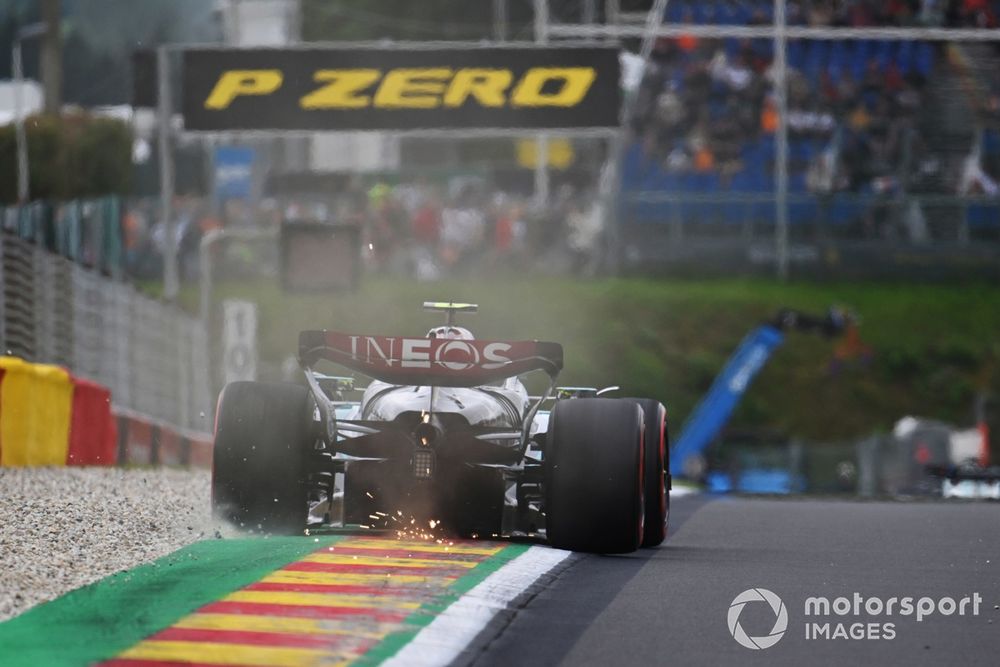
Will Mercedes be able to put up any resistance against a resurgent Verstappen?
Photo by: Sam Bagnall / Motorsport Images








